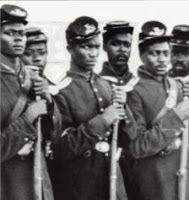R3 Editor
*This is the first of a four part series. Read the other installments here
Historian Edwin Redkey noted that the “Civil War marked a radical transformation in the in the lives of all African Americans” (336). Many African Americans believed that the war signaled not only God’s active hand at freeing enslaved people but also punishment for the institution of slavery. Moreover, many also believed that God used the Civil War as a sort of cleansing agent to rid the country of its stained past and finally to usher in a new day where all could enjoy liberty and freedom and no one believed this more than the first African American Chaplain in the United States Armed Forces, Henry McNeal Turner.
Scholarship on Turner in general is small and material of his career as a chaplain is scant. Outside of the only critical biography of Turner (Angell), an essay from Redkey in an edited volume, two volumes from myself and a newer work by Cole, there has not been much discussion about Turner on this part of his career. If scholars discuss Turner at all, they focus on his Black Nationalism and his calls for emigration or his later theological positions that had him declare, “God is a Negro.” Turner, however, left a treasure trove of material during his time as a chaplain in the columns of the AME organ, the Christian Recorder. As Redkey noted, all of Turner’s letters had a “distinctive writing style” and “a vigorous clear prose.” Many noted Turner for his “polysyllabic words, Latin quotations, convoluted sentences, opaque paragraphs, purple prose, and outright bombast” (340). Even while writing under the pseudonym “Uncle Sam” readers could identify his style.
However, more than their style, Turner’s letters attracted readers for their content—especially his eyewitness accounts of battles he and his fellow soldiers fought. He not only described their battles in exciting detail, but he also praised their courage and offered a counter narrative to the writing of the war that tended to leave out the heroics of black solders.  While Turner was a believer in the righteousness of the war, he did not start as a supporter. When the Civil war started, Turner was serving in Baltimore. In a diary entry dated May 13, one month after the start of the war Turner wrote:
While Turner was a believer in the righteousness of the war, he did not start as a supporter. When the Civil war started, Turner was serving in Baltimore. In a diary entry dated May 13, one month after the start of the war Turner wrote:
By the time he came to Washington, DC to serve Israel AME Church, his position on the war had changed. Turner began writing about how it was in God’s plan to teach the North through Southern victories and how if there was call for African American participation in the war, it must come not only with freedom for the fighting men, but eternal freedom for all African Americans (Johnson 85).
Shortly after president Abraham Lincoln issued the Emancipation Proclamation, the War Department lifted the banned on African Americans serving in the Armed Forces. However, while blacks began to serve, they could not become officers. Some African Americans refused to enlist unless they had some black officers, so the government made a compromise: the government would not appoint any black officers to command African American troops, but blacks could serve as chaplains. These chaplains would be commissioned officers but instead of having “gold braid on their uniforms, they would wear simple suits of black” (Redkey 338).
While the War Department established black regiments in Massachusetts, Turner began
his campaign to recruit black solders in Washington DC. Turner recruited both free born and “contrabands” to enlist in the 1st United States Colored Troops (USCT) (Redkey 338). When his congregation got upset over Turner’s support of the draft, he thundered in a sermon:
Further, he declared:
While Turner recruited for the war and preached about service in the war, he begin to campaign to get himself appointed chaplain of the Washington regiment that he helped create. In November of 1863, through a consistent and persistent campaign, Turner received his commission and became the first black chaplain in the Armed Forces.
To be continued………
Johnson, Andre E. and Henry McNeal Turner (ed). An African American Pastor Before and During the American Civil War. The Literary Archive of Henry McNeal Turner, Vol 1. Edwin Mellen Press, 2010
Redkey, Edwin. “Black Chaplain in the Union Army” in Black Soldiers in Blue:
African American Troops in the Civil War Era.The University of North
Carolina Press, 2002, 336-360












